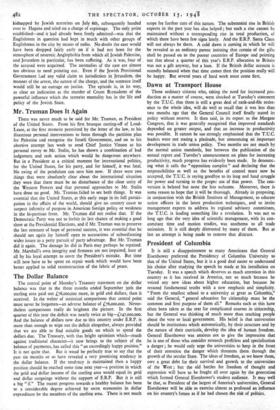Dawn at Transport House
Those ordinary citizens who, taking the need for increased pro- duction as a matter of course, were shocked at Tuesday's statement by the T.U.C. that there is still a great deal of rank-and-file resist- ance to the whole idea, will do well to recall that it was less than two months ago that the General Council itself finally stated its policy without reserve. It then said, in its report to the Margate Congress, that it was generally recognised that improved standards depended on greater output, and that an increase in productivity was possible. It cannot be too strongly emphasised that the T.U.C. leaders were not stating a platitude, but announcing an important development in trade union policy. Two months are not much by the normal union standards, but between the publication of the annual report and Tuesday's announcement on plans for increasing productivity, much progress has evidently been made. In denounc- ing what it calls the " opposition complex " and declaring that the responsibilities as well as the benefits of control must now be accepted, the T.U.C. is saying goodbye to its long and hard struggle for power and turning to the proper use of that power. The con- version is belated but none the less welcome. Moreover, there is some reason to hope that it will be thorough. Already in proposing, in conjunction with the British Institute of Management, to educate union officers in the latest production techniques,_ and to invite management experts to address its regional advisory committees, the T.U.C. is leading something like a revolution. It was not so long ago that the very idea of scientific management, with its con- comitant time and motion studies,- was anathema to all trade unionists. It is still deeply distrusted by many of them. But at last an attempt -is being made to remove that distrust.


































 Previous page
Previous page